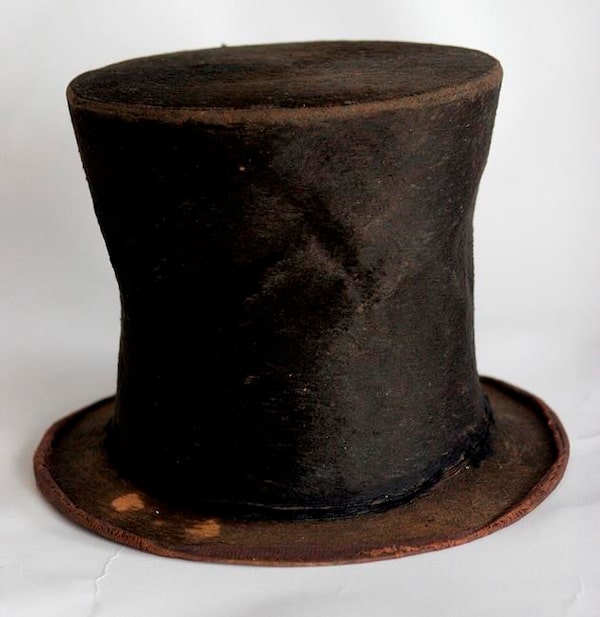An Illinois nonprofit bearing Abraham Lincoln’s name is so deep in debt that it is considering selling some of the 16th president’s possessions, including one of his iconic stovepipe hats and bloodstained gloves from the night of his assassination.

One of Abraham Lincoln's iconic stovepipe hats. (File Photo).Seth Perlman/The Canadian Press
In 2007, the private nonprofit, the Abraham Lincoln Presidential Library Foundation, in Springfield, Illinois, borrowed $23 million to purchase an expansive collection of Lincoln artifacts from a private collector. More than a decade later, the foundation has more than $9 million remaining on the loan, Carla Knorowski, the foundation’s chief executive, said.
For 11 years, the state-run Abraham Lincoln Presidential Library and Museum has had access to the collection, and that organization’s leaders say their priority is to keep the items available for public viewing.
“Prior to our purchase of these items, the only way you would have ever seen the hat or the gloves would be to have known the collector,” Knorowski said. “And know her well enough to knock on her door.”
Other headliners in the collection of 1,400 artifacts include locks of Lincoln’s hair, his presidential seal, unpublished letters to his wife, pages with scrawled arithmetic from when he was a boy and the quill that sat on his desk the night he was shot in 1865.
The foundation has tried to raise the rest of the money by pleading with potential donors and asking state government officials to disburse millions of dollars in grants to save the collection, Knorowski said. The foundation’s staff began a GoFundMe fundraiser in May, which has garnered only a fraction of the funds needed before the loan must be paid in full in October 2019.
On Wednesday, the foundation’s board agreed to start the search for auction houses. This doesn’t mean artifacts will go on the market any time soon, however. The foundation is starting the process now because it can take several months, Knorowski said.

Abraham Lincoln's bloodstained gloves from the night of his death. (File Photo).Seth Perlman/The Associated Press
Before the foundation acquired these items, they were part of what was considered the largest privately held collection of Lincoln-related artifacts in the world, according to the museum. The collector, Louise Taper, has had a passion for Lincoln since the 1970s.
She gained the money to fuel her collecting after she married Barry Taper, a scion of a prominent Los Angeles family whose father made a fortune in the savings and loan business.
When the foundation purchased the $25 million collection, $2 million worth of artifacts were given as a charitable donation, leaving the foundation to pay the remaining $23 million.
In June, the foundation tried to ease its debt by selling an unexpected item in the Lincoln-centric collection: a dress of Marilyn Monroe’s.
Monroe was apparently a die-hard fan of Lincoln’s, but because she was tangential to the rest of the collection, Knorowski said the foundation decided to sell off her items — including her dress and photographs, which fetched $54,000.
If some of the items in the Taper collection were ultimately sold, the state-run museum would hardly be bereft of Lincoln exhibits. The museum has thousands of items, including a printing of the Emancipation Proclamation signed by the president and the House of Representatives’ resolution for the 13th Amendment to end slavery.
Selling off artifacts and documents from the collection would be a “loss to all Americans,” Alan Lowe, executive director of the library and museum, said in a statement. He said he was confident, though, that in the event of an auction the museum would thrive without the collection.
But Knorowski said the museum was at risk of losing some items that bring Lincoln’s personality to life. “We don’t want to auction,” she said. “But if we’re put in that position, we have to do our fiscal responsibility.”
Seth Bongartz, president of Hildene, an estate in Manchester, Vermont, that belonged to Lincoln’s son Robert, said his museum also has one of the president’s stovepipe hats on display. The hat, one of three known to have survived, is a draw for visitors because people strongly associate it with Lincoln’s character, Bongartz said.
Although it seems like the foundation has exhausted its financial options, Bongartz said he hoped the artifacts remain on display rather than being sold and tucked away into a private collection.
“They do belong to the public,” he said. “To have them remain accessible would be the best of all possible worlds.”